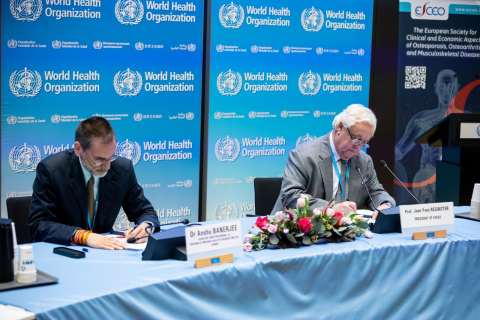
WHO and ESCEO announce collaborative agreement to benefit global osteoporosis and fracture prevention
BREAKING NEWS!
"ESCEO is very proud to partner with the World Health Organization (WHO), during the next 5 years to improve the screening, diagnosis, prevention and treatment of osteoporosis hence making the life of osteoporotic patients more beautiful."
Jean-Yves Reginster
President ESCEO

The comprehensive research plan will deliver valuable new data and evidence on the effectiveness of interventions to support and strengthen osteoporosis and fracture prevention within global healthcare agendas.
February 24, 2023 – Geneva, Switzerland
The World Health Organization (WHO) and the European Society for Clinical and Economic Aspects of Osteoporosis, Osteoarthritis and Musculoskeletal Diseases (ESCEO) signed an agreement to develop a strategic roadmap on bone health and ageing and advocate for a public health strategy to prevent fractures among older people. The collaboration entails a strategic road map of research and publication deliverables, in recognition of the fact that osteoporosis is a major contributor to the Global Burden of Disease.
The collaboration agreement, signed on February 23, 2023 at WHO Headquarters in Geneva, Switzerland, is an important springboard for osteoporosis, a disease which continues to suffer from under-prioritization in healthcare agendas worldwide. Although globally an estimated one in three women and one in five men aged over 50 years will sustain a potentially life-threatening fragility fracture in their remaining lifetimes, the majority of high-risk individuals remain undiagnosed and untreated. Furthermore, systematic post-fracture care for secondary fracture prevention is not available to the vast majority of fracture patients who are at high risk of recurring fractures.
Professor Jean-Yves Reginster, President of ESCEO, stated: “With the ageing of the world’s populations, musculoskeletal disorders such as osteoporosis are on the rise, posing an increasing and costly burden on healthcare systems. We believe that this important agreement with the WHO signifies recognition that action must be taken to address the fragility fracture crisis. Currently, the WHO Collaborating Centre for Epidemiology of Musculoskeletal Conditions and Ageing, in Liège, Belgium, is the only institution that technically assists WHO in matters concerning musculoskeletal conditions that affect older people as mandated by the WHO Director-General. The impactful data and evidence that we will deliver under the umbrella of this broader agreement, together with the important publications to be actioned by the WHO, are of immense significance.”
Within the framework of the five-year collaboration, commencing in the first quarter of 2023, WHO, in collaboration with the International Osteoporosis Foundation (IOF) and the WHO Collaborating Center for Epidemiology of Musculoskeletal Health and Ageing at the University of Liège, Belgium will commence on a broad range of research. This will include, among other research objectives, collecting data on the prevalence and incidence of osteoporosis and fractures for countries and regions around the world, and reviewing evidence on interventions for preventing fracture in older persons to inform guideline development and evidence-informed decision making. In return, WHO has committed to generating a range of important publications, including global health estimates on prevalence and incidence, as well as commentary on interventions for preventing fractures.
Together, the impactful data and influential WHO publications are expected to put osteoporosis on the global map, thereby helping to drive much-needed policy action.
IOF President Professor Cyrus Cooper stated: “We are delighted and honoured to be working with the World Health Organization on this important collaborative initiative. WHO plays an essential role in the global governance of health and disease, including by establishing international standards, and by coordinating multiple actors toward common goals. We expect that the strategic research and publications within the framework of this collaboration will lay the groundwork for the prioritization of osteoporosis and fragility fracture prevention within global healthcare policy. In this sense, the collaboration is truly a game-changer for people with osteoporosis worldwide.”
Dr Anshu Banerjee, Director, Department of Maternal, Newborn, Child and Adolescent Health and Ageing, added: “The initiative will serve to promote action on musculoskeletal conditions, in keeping with the goals of the Decade of Healthy Ageing 2020-2030 for concerted, sustained collaboration to improve the lives of the world’s older population. We look forward to a productive collaboration in the years ahead.”